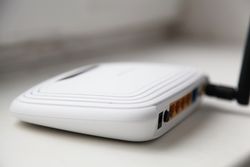
When you open your laptop or turn on your smartphone at home, you might not think twice about your immediate ability to access the global Internet. However, that connection is made possible by a few essential pieces of telecommunications equipment, including a router. If you’re unfamiliar with how this component facilitates your Internet connection, learn more information below.
What Is an Internet Router?
Your Internet router, known as a residential gateway, is responsible for creating your home network. Your home network consists of all the devices you might use to surf the web, including laptops, desktops, smartphones, and tablets. In addition to connecting these devices, your router can protect your network from threats lurking on the worldwide web, such as viruses.
How Does It Work?
 Routers work in tandem with a modem, which is the other Internet-related box in your home office or entertainment center. Modems are responsible for taking the network your router created and connecting it to the Internet. Routers are all assigned private IP addresses, which your computers and other devices search for whenever they want to connect to the Internet. Therefore, when you connect to your home Wi-Fi network, you’re essentially routing your computer to the router. From there, the router analyzes the data being sent over the network, reorganizes it, and sends it to the modem, which then sends it to the Internet.
Routers work in tandem with a modem, which is the other Internet-related box in your home office or entertainment center. Modems are responsible for taking the network your router created and connecting it to the Internet. Routers are all assigned private IP addresses, which your computers and other devices search for whenever they want to connect to the Internet. Therefore, when you connect to your home Wi-Fi network, you’re essentially routing your computer to the router. From there, the router analyzes the data being sent over the network, reorganizes it, and sends it to the modem, which then sends it to the Internet.
What Are the Different Types?
The most common type of router is the standard Wi-Fi router. This popular piece of telecommunications equipment creates a wireless network that you can easily connect to from your smartphone, tablet, or computer. In some cases, Wi-Fi routers combine the responsibilities of routers and modems.
Broadband routers require ethernet cables and phone jacks, as they are made to convert analog signals into digital ones, such as for VoIP phone services.
Core routers are capable of moving data from device to device in the same network. However, they can’t move information to other networks.
Quality of Service (QOS) routers are designed to prioritize voice traffic over data traffic, so that phone calls are stable even when the Internet is being accessed from another device. QoS routers typically offer more built-in security protocols than your standard Internet Provider’s router.
If you’re interested in learning more about the various components of an Internet connection, reach out to ACC Telecom. This Maryland-based telecommunications equipment company has over three decades of experience providing phone, Internet, and security systems to area customers. In addition to installing your new equipment, they will provide complimentary help desk support and around-the-clock emergency service. To learn more about their offerings, including VoIP phone service, visit the website. You can also call (410) 995-0101 to speak with a representative.
About the Business
Have a question? Ask the experts!
Send your question

